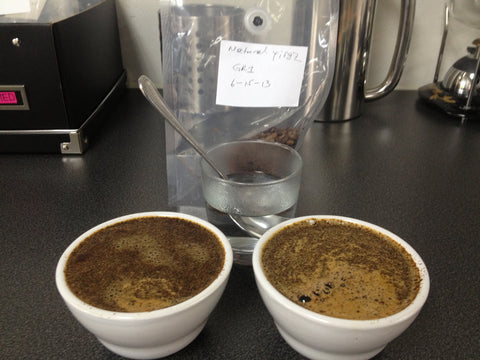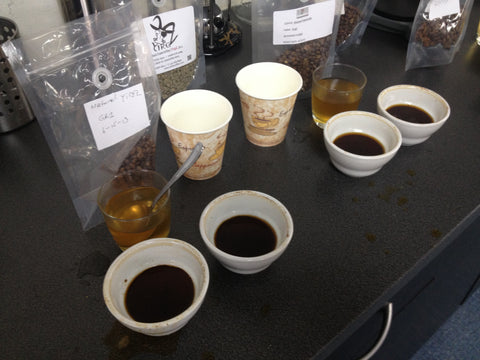YirgZ G1 Natural - the first tasting.
While cupping coffees is a normal part of what we do at Spro, every once in a while you run into a coffee that is eye-opening.
Nestled along a tree-lined avenue in Towson is the headquarters of one of Baltimore's true secrets: Keffa Coffee. Keffa isn't a coffee shop or a place where you can go to get a cup of joe, it's the offices of one of the most exciting coffee importers in America, focusing on Ethiopian coffees. Run by our friend, Samuel Demisse, who works with connections in the growing regions of Ethiopia to find truly exceptional lots of coffee.
Today, we were cupping new crop arrival samples of Keffa's new YirgZ line of washed and natural-processed coffees. Graded by the Ethiopian Coffee Exchange (ECX) as a Q1 (highest quality) coffee, the YirgZ takes a critical step towards improving the cup quality: additional sorting time.
When a coffee is being processed in Ethiopia (and around the world), the coffee is sorted by hand. In Ethiopia, women sort the coffee in 24 kilogram lots for three minutes per lot. The result runs the gamut of coffees available from Ethiopia. However, for the YirgZ, Keffa specifies a smaller lot size (10 kilos) and longer sort time (six minutes), producing what is essentially a "zero defect" coffee.
Of course, this additional step adds to the cost of producing the coffee but the results are dramatic. So dramatic that the impact of the coffee lingers in the mind. Samuel himself couldn't sleep the first few nights after the first tasting samples because he was so excited about the coffee!
Samples so good - we killed them!
If you look at the cupping samples in the picture above, you'll notice that we've tasted (which in this case meant: drank) the samples all the way down to the bottom. That's not something you see in a normal coffee cupping!
The coffee is grown in southwestern Ethiopia around the town and region of Yirga Cheffe where small plot farmers grow the coffee and then deliver the ripe cherries to the local processing mill. The mill buys the cherries directly from the farmer and then processes them accordingly. Washed coffees are first slightly crushed to separate the bean from the outer hull and then placed in a water bath for up to 24 hours to remove the mucilage (a thin, sweet pulp layer) through fermentation before being dried in the sun and stored in parchment. Natural processed coffees are raked out as whole cherries in the sun where they are allowed to dry. Once dried, the husk is dry milled off of the bean and then stored in parchment.
The coffee is left in its parchment skin, which is a protective layer that forms around the bean similar in texture to parchment paper, that must be dry milled before releasing. Samples are then taken of the parchment coffee by the ECX for grading at the regional warehouses and coffees are roasted, tasted and scored with Q ranges from 1 (highest quality) to 5 (lowest quality). Once graded, the coffee is then moved to the regional ECX warehouse for storage until that coffee is purchased and moved for delivery.
Once selected for export, the coffee is then graded for export from G1 to G5. At one point in time, the G numbers were designated for the type of processing (G1 and G2 for washed, G3 and G4 for natural), but recently the ECX has changed to a numerical ranking system.
Both the washed and natural YirgZ are graded Q1 and G1 by the ECX and represent some of the finest Ethiopian coffee we've ever seen, and at a nice price point. The YirgZ Washed will be replacing our Limu G2 coffee very soon and once the YirgZ Natural arrives at the Port of Baltimore, we will be getting some of that too!
Our initial tasting notes on the Washed delivered a clean, sweet, earthy cup with a distinct citrus brightness that is crisp and lively. The Natural was surprising in that it departed from the berry fruitiness that is typical of natural processed Ethiopian coffees with strawberry aromas, sweet lemony peach, notes of apricot, mango, pineapple and papaya.
I think you'll love these as much as we do!
Jay
YirgZ Washed & Natural G1
Elevation: 1800-2000 meters
Harvest: October 2012 - February 2013
Shipped and Stored in GrainPro

